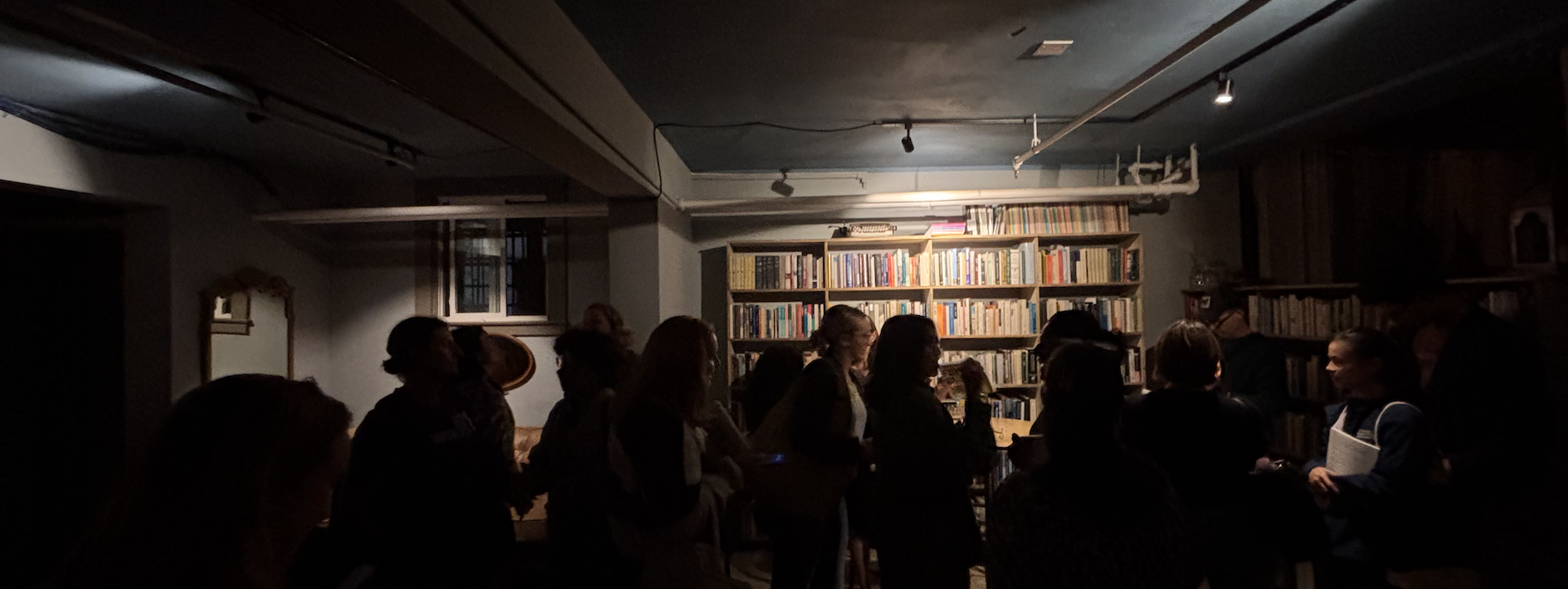Two men in two metal chairs on the Perkins Street sidestreet sidewalk, in their late 50s (sporting glasses, scruff, and grey-scale clothing), debate the cultural merits of living in Oakland versus New York. I’m speed walking past them, through the open side door that leads into the events room of Clio’s Books. If I’d had five extra minutes, I’d be mingling, savoring the Clio’s ambiance: happy hushed chatterers on vintage bar stools, a wood floor flexing slightly under boho rugs, vintage books grouped by epoch, all conjuring Alice-in-Wonderland-flea-market-speakeasy-Ivy-league-library. A chalk-scribbled invitation to put phones away lines the front entrance wall, pooling attention and warding off airpods and the metallic sweat stuffiness of cafes where too many duos have battled for the one remaining outlet.
In the backroom—booklined, rug adorned, and amber-lit—Christina Badaracco and Jeanne Merrill sit in high steel chairs with upright posture, Badaracco’s The Farm Bill, a Citizen’s Guide, propped and stacked on the circular table. It’s September 29, 7 pm, and by the time the moderator and Clio’s co-owner Cari Borja introduces the two, the forty or so rowed and collapsible seats have filled (as well as the loungey couches in the back). The crowd is rapt, even taking notes as Borja prompts Badaracco and Merill to unravel just how this 90 billion annual bucks bill affects even Bay Area non-agrarian folks as they sample farmer’s market plums or brave Berkeley Bowl Sunday shopping cart gridlock.
Badaracco is a nutritionist with a degree from Berkeley and a background in healthcare and Food is Medicine research and policy, a growing field linking nutrition to the most common U.S diseases. Merrill spent decades in government and nonprofit roles advocating for equitable agriculture policies, holding both state and federal positions before directing the Berkeley Food Institute. They answer questions like seasoned food and agriculture policy researchers—thoroughly, fact-based, building respectfully off of one another—but the conversation meanders, from personal connection to food systems (Badaracco recalls her passion sparked from gardening with her family and Merrill from her early years advocating with farmworkers affected by pesticide drift) to the details of the current farm bill, now stalled, given the government shutdown, but structured to subsidize big ag like such bills have since the Great Depression. The conversation siphons into what the audience can do to support agricultural workers and small-scale regenerative farming practices, given federal program slashing, as well as what organizations and newsletters to keep up with the many elements of food and farming.
Borja opens the conversation for audience questions, which are niche, coming from fellow food systems scholars and professionals. A recently laid off government employee wonders what’s next for local food purchasing programs; a journalist and UC Berkeley grad student both have targeted questions about farmer’s insurance systems; a longtime farmer shares about her transition out of rooftop urban agriculture. The wording of audience questions matches the energy conveyed by the panelists, a blend of passion, expertise, and an awareness of the complexity of the problem of federal support of industrialized agriculture and processed food, combined with a maintenance of hope through advocacy work, coalition building, and celebration of incremental change.
The talk ends; the room lingers.
Two lines snake against the books as people wait patiently to chat with the panelists. I strike up a conversation with a man working in local city Food is Medicine programming and unintentionally become a line waiter. He farmed on the East Coast before coming to the Bay for the job (and almost under his breath, admits he went to Yale). As we chat about our local favorite East Bay spaces to build community, our place in line bloats with a few of my friends; fifteen minutes pass, the focus shifting away from waiting for a panelist’s ear to how we all struck up an interest in the ever-vague “food system.”
It’s past nine pm, the official end-time, but no one seems to care. Our micro group matches the tone of the rest of the audience–educated, earnest, with a proclivity for feeling the earth on our hands, and maybe also in attendance to answer the impossible question: What happens next?
